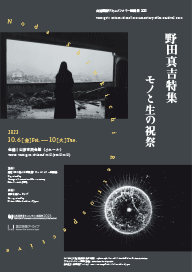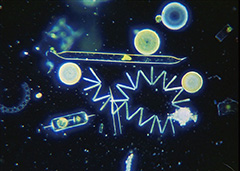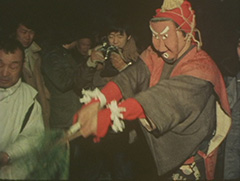Noda Shinkichi Retrospective: A Festival of Things and Life
• October 6–10 [Venue] CS Yamagata Citizens’ Hall (Small Hall)

Download: Flyer (PDF, 3.9MB)
Noda Shinkichi (1913–1993) joined P.C.L., the predecessor of Toho, in 1937. After Japan’s defeat in WWII, he took part in the Toho Labor Dispute and became a freelance filmmaker, working on numerous documentary films. A retrospective of this documentarist’s activities during and after the war reveals his unique perspective on the relationship between “things” and “life” transcending the boundaries between human and non-human, living and inanimate.
For example, the corporate PR film Marine Snow: The Origin of Oil (1960) presented the long period of time when the remains of microorganisms were eventually transformed into crude oil. The visual poem A Town Not Yet Seen (1963) peels back the veil of an ordinary town to closely observe its inorganic facets. Snow as Flowers: Niino’s Snow Festival (1980), his film about folk culture, was a record of festivities that interpret the snow flurries in winter as a sign of the fertility of life that will soon come in the spring. Noda, who was a core member of the Documentary Filmmakers Association and the Eizo Geijutsu no Kai (Association for Film Art), argued with Matsumoto Toshio and others and sought not just to record “facts” but to transform his own life in the face of real “things,” and his method of documentary filmmaking to transform reality. Noda’s films, too, eschewed the dualism of subject and object, and captured the world as a circle of transmigration. His gaze included a fundamental criticism of the wisdom and structure underlying modern society. This year, thirty years after his death, we would like to revive the untapped potential of Noda Shinkichi’s films on the screen in Yamagata.
- • Oct. 6
Program 1 - Renovating Farm Houses * 1941 / 20 min *Postwar version
Festivals in Tohoku Part 1 * 1956 / 11 min
Festivals in Tohoku Part 2 * 1956 / 10 min
Festivals in Tohoku Part 3 * 1957 / 20 min
Forgotten Land: Record of Life Series II 1958 / 30 min
- Program 2
- The Girl of the Valley * 1949 / 49 min
The Locomotive Kid * 1950 / 45 min
Work in Retail 1951 / 18 min

- • Oct. 7
Program 3 - The Unforgivable Atom Bomb: The Singing Voice of 1954 Japan 1954 / 28 min
The Matsukawa Incident: Seeing the Truth Through the Wall * 1954 / 63 min
- Program 4
- The Workers of Keihin 1953 * 1953 / 45 min
June 1960: Rage Against the Security Treaty 1960 / 41 min
- Program 5
- The New Japanese Geography Film Series: Tone River * 1955 / 20 min
The New Japanese Geography Film Series: The Roofs of Honshu * 1957 / 21 min
The New Japanese Geography Film Series: Tokaido, Yesterday and Today * 1958 / 21 min
The New Japanese Geography Film Series: Villages of the Northeast * 1959 / 20 min
- Program 6
- Technique of Foundry: The Cupola Operation * 1954 / 18 min
Marine Snow: The Origin of Oil * 1960 / 25 min
Country Life under Snow 1956 / 32 min
+Talk: Okada Hidenori, Tanaka Shimpei
- • Oct. 8
Program 7 - Tying Land and Sea 1960 / 30 min
Carrying the Olympics 1964 / 41 min
Nitiray A La Carte 1963 / 31 min
- Program 8
- A Town Not Yet Seen 1963 / 12 min
The Loneliness of Two Long Distance Runners * 1966 / 9 min
Collapsed Swamp, or Painter Yamashita Kikuji 1976 / 38 min
Mizutani Isao’s Wanderings through Ten Spiritual Worlds 1984 / 34 min
+Talk: Oda Kaori

- • Oct. 9
Program 9 - The Mikagura Festival of Tomiyama Village 1985 / 50 min
The Procession of Weird and Wonderful Masks 1988 / 18 min
Sarushima-Island With a Fort: Ruins and Graffiti * 1987 / 25 min
- Program 10
- The Feast of the Gods on a Winter’s Night: Toyama’s Shimotsuki Festival * 1970 / 37 min
Good Road for the Living and the Dead: Niino Bon Odori, Festival to Send Off the Gods * 1991 / 36 min
+Talk: Kitamura Minao
- Program 11
- Snow as Flowers: Niino’s Snow Festival * 1980 / 129 min
- • Oct. 10
Program 12 [Admission Free] - A Million Prayers for Amitabha Buddha and the Lion Dance of Yozuku 1971 / 25 min
Yoshihama’s Kashima Dance, Ashigara’s Sasara Dance 1971 / 32 min
The Lion Dance of Toya 1972 / 16 min
Miura Kikuna’s Ameya Dance 1972 / 12 min
Sagicho in Oiso 1972 / 14 min
The Horse-running Ritual of Honmoku Shrine 1973 / 13 min
* Source: National Film Archive of Japan
